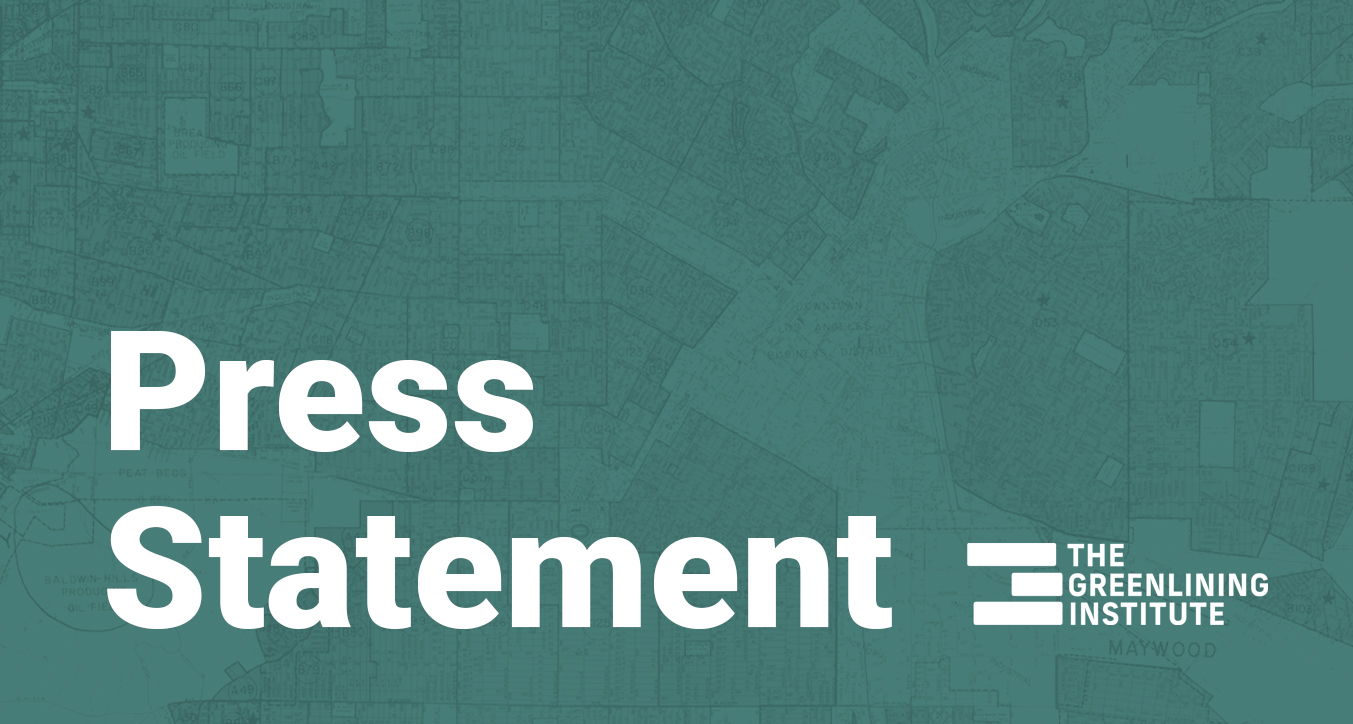Cuts and Deferrals to Key Programs in 2024-2025 California Budget Proposal Spotlight Need for Systemic Change

Media Contact
Danielle Bell
SENIOR PROGRAM MANAGER FOR MEDIA RELATIONS
media@greenlining.org danielle.bell@greenlining.orgHistoric budget deficit leads to cuts in climate and housing, hitting communities of color hardest
Governor must balance a budget that invests in long term strategies to shore up resilience and unravel the root causes of the racial wealth gap
(Oakland, CA) — Governor Newsom’s 2024-25 California Budget proposal highlights deep flaws in the state’s economic system, as one of the world’s largest economies swings from a historic budget surplus to a historic deficit in a matter of years putting crucial equity progress at risk. While Newsom aims to position California as an equity leader, the precarious economic situation the state faces with this year’s $37.9 billion deficit will lead to cuts and delays in essential investments in equity, climate progress, and housing affordability once again.
Californians need an integrated approach to the problems we face. We need “Greenlined” policies and investments–a term we at The Greenlining Institute use to describe policies that target investments in formerly redlined communities to deconstruct historic and pervasive discrimination, while simultaneously empowering these communities to shape innovative and equitable solutions.
“Californians badly need systemic change for a more sustainable and stable state budget because this cycle of boom and bust is getting worse,” said Alvaro Sanchez, Vice President of Policy at The Greenlining Institute. “We deserve a just economy that enables everyone–not just the wealthy few–to thrive during economic ups, but doesn’t decimate our hard-earned progress on equity when the economy slows. We shouldn’t have to choose between funding the immediate needs of our most vulnerable neighbors, and maintaining investments in communities of color that have been underserved for decades. In order to build resilience for what lies ahead, California must be able to do both. We are calling on the Governor and Legislature to work together to identify long-term, diverse, and reliable funding sources, so we can make the meaningful investments that communities of color need to thrive. We know this is possible, and we know this is the future we deserve,” Sanchez continued.
Impact on Key Equity Programs and Investments:
Zero funding earmarked for Transformative Climate Communities (TCC), a program nationally championed by environmental justice and equity groups that can help build long term resilience to combat climate change.
- The state previously zeroed out the program by cutting $140 million in funding for the program in last year’s budget, and reverted an additional $65 million to the general fund from the 2022-23 budget. There are currently over a dozen communities with planning grants that are waiting on implementation funding to make their transformative climate visions a reality.
- We strongly recommend funding TCC through the general fund or the Greenhouse Gas Reduction Fund (GGRF), the revenue source that has historically funded the program.
Absent of commitments to implement SB 253 (Wiener, 2023)–landmark climate accountability legislation signed into law last year.
- The Governor’s proposal did not indicate implementation funding to California Air Resources Board (CARB), the agency tasked with overseeing the nation’s first Corporate Climate Accountability law which would require companies with revenue of over $1 billion that do business in California to disclose their greenhouse gas emissions.
- All it will take is a reasonable investment–$3 million—in staffing at CARB to ensure the public can access crucial information regarding emissions. This pales in comparison to the hundreds of millions spent by fossil fuel and corporate interests to keep this kind of information out of public view.
$9.8 million in cuts from Regional Climate Collaboratives (RCC)–funding that communities have already applied for and are waiting to receive. This funding was previously committed to the program in the Governor’s 2022-23 Budget.
- The Strategic Growth Council (SGC), the agency that administers RCC had already opened up a solicitation for Round Two applications in 2023 with the intent to provide awards to communities in 2024.
- This is funding SGC and community partners were all relying on to support critical capacity building efforts for their communities. We strongly urge the Governor to reinstate the $9.8 million back to RCC so communities can access funds for capacity building that they have already applied for and are counting on.
$283 million in cuts from the Equitable Building Decarbonization program from the $922M originally committed in the Governor’s 2022-23 Budget.
- The Equitable Building Decarbonization program is a first-of-its-kind program targeted at low-income households in disadvantaged communities across California.
- The California Energy Commission (CEC) finalized guidelines last year with the program expected to begin work in low-income households across the state in 2024. Cutting funding will slow much-needed dollars to address the comprehensive needs of decarbonizing priority households that face poor indoor air quality, high energy bills, and low-quality housing conditions.
- We urge the state to maintain its original commitment and reinstate $283 million back to the program.
Zero funding allocated to CARB’s Low Carbon Transportation Programs, despite maintaining the commitment of $10 billion in clean transportation investments through the state’s Zero Emissions Vehicle (ZEV) package.
- $600 million in funding for CARB’s Low-Carbon Transportation Programs will be delayed till FY 2027-28, meaning there will be no budget for FY 2024-25, impacting truck and bus programs, Clean Cars 4 All, and Clean Mobility programs.
- The ZEV package sees cuts to funding for drayage trucks and infrastructure, which are required to go 100% zero-emissions by 2035.
- We request not delaying funding for these critical programs which have been underfunded for years and ask the state to deliver on its previous commitments and provide the needed relief to low-income and disadvantaged communities that continue to suffer disproportionately from harmful pollution.
The Greenlining Institute previously submitted a letter to Governor Newsom urging him to invest in or maintain funding for critical equity initiatives including Transformative Climate Communities Program and Regional Climate Collaboratives Program. Greenlining also urged the Governor to allocate funding for the California Air Resources Board to implement SB 253 (Wiener, 2023), and Clean Mobility Programs and Medium-Heavy Duty Investments within the Zero-Emission Vehicle Package.
“The Greenlining Institute will continue to fight for communities absorbing the impact of fiscal delays and shifts to equity programs our state previously committed to. These are historic initiatives and nationally recognized programs that build resilience through economic shortfalls and instability, yet they are being rolled back, or absent from the conversation entirely” said Melanie Morelos, California Strategy Senior Program Manager. “Much like the communities we serve, our organization remains anchored to our mission to ensure our residents are prioritized when Governor Newsom and the Legislature decide who is prioritized in times of fiscal restraint.”
To learn more about The Greenlining Institute, visit www.greenlining.org.
###


